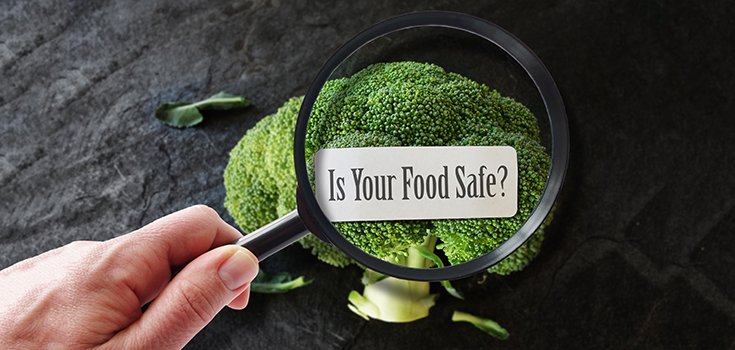Top 12 Pesticide-Dosed Foods of 2018 – Along with the 15 Cleanest Foods

The Environmental Working Group (EWG) has published its annual Dirty Dozen and Clean 15 lists of the fruits and vegetables that are the most and least contaminated with pesticides. Strawberries top the list of the “dirtiest” fruits on the market.
The nonprofit, nonpartisan environmental organization has been publishing its lists, which rank pesticide contamination in 47 popular fruits and vegetables, since 2004.
Let’s take a look at this year’s Dirty Dozen:
- Strawberries
- Spinach
- Nectarines
- Apples
- Grapes
- Peaches
- Cherries
- Pears
- Tomatoes
- Celery
- Potatoes
- Sweet Bell Peppers
- +Hot Peppers

This year, EWG tacked hot peppers onto the bottom of the Dirty Dozen list, because nearly 3/4 of the vegetables contained traces of “highly toxic” pesticide residues.
The Clean 15 list is pretty self-explanatory.
These are the fruits and veggies that testing revealed to contain the least pesticide residues.
- Avocados
- Sweet Corn
- Pineapples
- Cabbages
- Onions
- Frozen Sweet Peas
- Papayas
- Asparagus
- Mangoes
- Eggplant
- Honeydew Melons
- Kiwis
- Cantaloupes
- Cauliflower
- Broccoli

Important Findings
For its 2018 Shopper’s Guide to Pesticides in Produce™, EWG analyzed recent tests conducted by the U.S. Department of Agriculture (USDA). The group found that nearly 70% of samples of conventionally grown produce were contaminated with pesticide residues.
A total of 230 different pesticides and pesticide breakdown products were detected by the USDA in thousands of produce samples.
- Ten or more pesticides residues and breakdown products were found on more than 1/3 of strawberry samples analyzed in 2016.
- More than 98% of samples of strawberries, peaches, potatoes, nectarines, cherries and apples tested positive for residue of at least one pesticide.
- Investigators found that spinach contained, on average, nearly twice as much pesticide residue by weight compared to any other fruit or vegetable.
- Less than 1% of avocado and sweet corn samples showed any detectable pesticides.
- No pesticide residues were found on 80% of samples of pineapples, papayas, asparagus, onions and cabbages.
- None of the samples of the fruits on the Clean 15 list tested positive for more than 4 pesticides.
In a news release, Sonya Lunder, senior analyst with EWG, said:
“It is vitally important that everyone eats plenty of produce, but it is also wise to avoid dietary exposure to toxic pesticides, from conception through childhood. With EWG’s guide, consumers can fill their fridges and fruit bowls with plenty of healthy conventional and organic produce that isn’t contaminated with multiple pesticide residues.”
Pesticides and Infertility
Recently, two studies have shed more light on why, as Lunder said, it is “wise to avoid dietary exposure to toxic pesticides, from conception through childhood.” Both bodies of research come from scientists at the Harvard T.H. Chan School of Public Health.
In one study, women who reported eating two or more servings per day of produce with higher pesticide residues were 26% less likely to have a successful pregnancy, compared to women who ate fewer servings of these foods.
Read: Eating Pesticide-Laden Fruit Found to Cause Infertility
In the second study, men who ate pesticide-laden produce had poorer sperm quality.
The men and women involved in the studies had gone to a fertility clinic seeking treatment. Researchers found that the frequency of eating low-residue produce was not associated with fertility problems.

Chlorpyrifos and Potential Brain Damage to Children
One of the pesticides discovered on some of the produce was chlorpyrifos, a neurotoxic insecticide that can harm the brains and nervous systems of children. The chemical is applied to apples, bell peppers, peaches, nectarines, and other produce.
The U.S. Environmental Protection Agency (EPA) was slated to ban all uses of chlorpyrifos on foods in early 2017. However, that decision was nixed by then EPA Administrator Scott Pruitt after Dow Chemical, the manufacturer of chlorpyrifos, complained. Pruitt declined to reverse the decision, even after the American Academy of Pediatrics pleaded with him to do so.
Read: Group of Senators Push for Ban of the Toxic Pesticide Chlorpyrifos
As a result, the Academy recommends that parents consult EWG’s Shopper’s Guide to help reduce their children’s level of pesticide exposure.
Dr. Philip Landrigan of the Icahn School of Medicine at Mount Sinai in New York, said:
“There is a reason pediatricians encourage parents to consult EWG’s guide and take other steps to reduce their child’s exposure to pesticides. Pesticides can cause harm to infants, babies and young children at even low levels like those found on some foods.”
Source:
